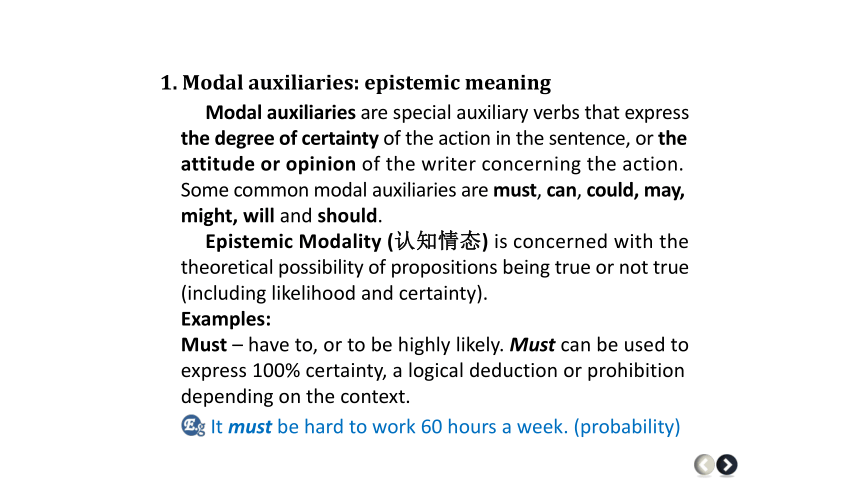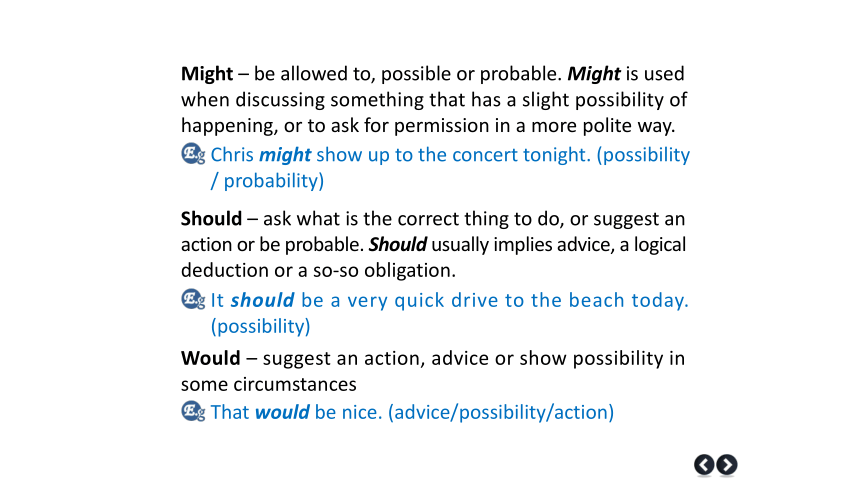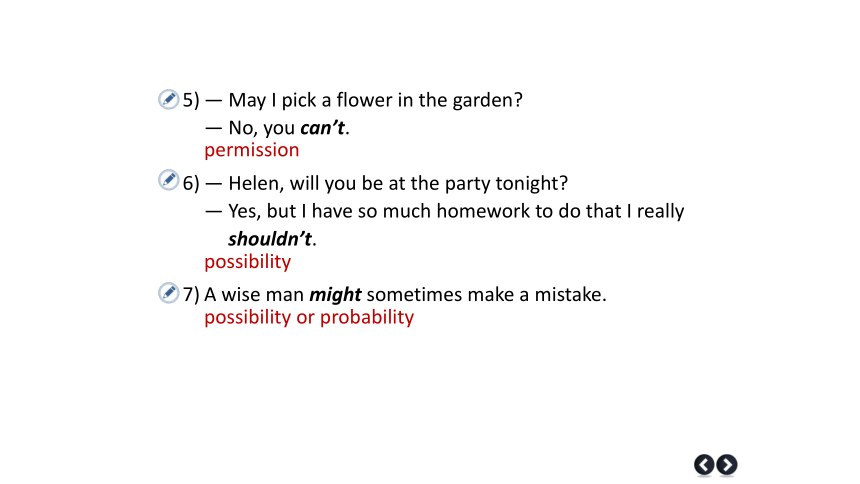2023届高考英语二复习 Model Verbs情态动词课件(共12张PPT)
文档属性
| 名称 | 2023届高考英语二复习 Model Verbs情态动词课件(共12张PPT) |  | |
| 格式 | zip | ||
| 文件大小 | 1.4MB | ||
| 资源类型 | 教案 | ||
| 版本资源 | 通用版 | ||
| 科目 | 英语 | ||
| 更新时间 | 2022-11-09 23:00:30 | ||
图片预览






文档简介
(共12张PPT)
Model Verbs
1. Modal auxiliaries: epistemic meaning
Modal auxiliaries are special auxiliary verbs that express the degree of certainty of the action in the sentence, or the attitude or opinion of the writer concerning the action. Some common modal auxiliaries are must, can, could, may,
might, will and should.
Epistemic Modality (认知情态) is concerned with the theoretical possibility of propositions being true or not true
(including likelihood and certainty).
Examples:
Must – have to, or to be highly likely. Must can be used to express 100% certainty, a logical deduction or prohibition
depending on the context.
It must be hard to work 60 hours a week. (probability)
Can – be able to, to be allowed to, or possible. Can is a very common modal verb in English. It’s used to express ability, permission and possibility.
It can be done. (permission / possibility)
Could – be able to, to be allowed to, or possible. Could is used when talking about an ability in the past or for a more
polite way to ask permission.
Mark could show up to work today. (possibility)
May – be allowed to, it is possible or probable
I may have to cancel my plans for Saturday night. (possibility
/ probability)
Might – be allowed to, possible or probable. Might is used when discussing something that has a slight possibility of
happening, or to ask for permission in a more polite way.
Chris might show up to the concert tonight. (possibility / probability)
Should – ask what is the correct thing to do, or suggest an action or be probable. Should usually implies advice, a logical
deduction or a so-so obligation.
It should be a very quick drive to the beach today. (possibility)
Would – suggest an action, advice or show possibility in
some circumstances
That would be nice. (advice/possibility/action)
Practice: Identify the meaning of the words in italics.
The lies were most often not what most of us would call earth-shattering.
Might that, too, be a lie
It will confound your enemies and astound your friends.
— When can I come for the photos I need them tomorrow afternoon.
— They can be ready by12:00.
1)
2)
3)
4)
probability
possibility
probability
possibility
— May I pick a flower in the garden
— No, you can’t.
— Helen, will you be at the party tonight
— Yes, but I have so much homework to do that I really
shouldn’t.
A wise man might sometimes make a mistake.
5)
6)
7)
permission
possibility
possibility or probability
2. The infinitive and the -ing participle as object
There are certain words in English that are usually followed by an infinitive or gerund.
The infinitive
The infinitive may function as a subject, object, predicative, attributive, or adverbial in a sentence. Although an infinitive is easy to locate because of the to + verb form, deciding what function it has in a sentence can sometimes be confusing.
Examples:
To wait seemed foolish when decisive action was
required. (subject)
Everyone wanted to go. (object)
His ambition is to fly. (predicative)
He lacked the strength to resist. (attributive)
We must study to learn. (adverbial)
Use Example
after certain expressions (without “to”) Why not go to the cinema
after certain verbs (without “to”) I can swim.
after certain verbs (with “to”) He wants to swim.
after certain verbs with interrogatives (infinitive constructions) They don’t know how to swim.
after certain verbs with objects (without “to”) He made her swim.
after certain verbs with objects (with “to”) They wanted him to swim.
after certain adjectives and their comparisons (with “to”) It’s easier to swim downstream.
after nouns deriving from the verbs mentioned above (with “to”) We made a promise to swim. (derived from the verb “to promise”)
Certain words are followed by an infinite verb with or without “to”.
The -ing participle
The -ing participle or the gerund is a verb that functions
as a noun referring to an action, a process or a state.
We can use gerund as the object of the sentence.
When the gerund is a noun, it can be the object but it is still a verb and can have its own object. It has this structure:
Subject + Verb + Object [Gerund] + Object …
Examples:
Luke likes playing video games.
I hate packing suitcases.
My favourite thing to do is reading horror books.
He loves telling the story of him winning the math
contest to his friends.
I enjoy working as a volunteer during summer.
Use Example
after certain adjectives He’s afraid of going by plane.
after certain prepositions Before going to bed he turned off the lights.
after certain verbs I enjoy cooking.
after certain verbs with prepositions I am looking forward to seeing you again.
after certain nouns We had problems finding our way back home.
Certain words are followed by an –ing form.
Use Example
same meaning I started to read. / I started reading.
same meaning but different use She forbids us to talk. / She forbids talking.
different meaning He stopped to smoke. / He stopped smoking.
infinitive or present participle I saw him go up the stairs. / I saw him going up the stairs.
Words followed either by infinitive or –ing form
Practice: Complete the sentences with the proper
forms of the verbs given.
We intended ________ early. (leave)
I have a paper ________ before class. (write)
Phil agreed ________ me a ride. (give)
Only a few people admitted _____________ (lie) to their parents in the previous year.
Do you feel like ___________ (go) to a film or would you rather _________ (stay) at home
I tried __________________ (pacify) him but he refused _______________ (pacify) and went on _____________ (grumble).
1)
2)
3)
4)
5)
6)
to leave
to write
having lied
going
to be pacified
grumbling
to give
stay
to pacify
Model Verbs
1. Modal auxiliaries: epistemic meaning
Modal auxiliaries are special auxiliary verbs that express the degree of certainty of the action in the sentence, or the attitude or opinion of the writer concerning the action. Some common modal auxiliaries are must, can, could, may,
might, will and should.
Epistemic Modality (认知情态) is concerned with the theoretical possibility of propositions being true or not true
(including likelihood and certainty).
Examples:
Must – have to, or to be highly likely. Must can be used to express 100% certainty, a logical deduction or prohibition
depending on the context.
It must be hard to work 60 hours a week. (probability)
Can – be able to, to be allowed to, or possible. Can is a very common modal verb in English. It’s used to express ability, permission and possibility.
It can be done. (permission / possibility)
Could – be able to, to be allowed to, or possible. Could is used when talking about an ability in the past or for a more
polite way to ask permission.
Mark could show up to work today. (possibility)
May – be allowed to, it is possible or probable
I may have to cancel my plans for Saturday night. (possibility
/ probability)
Might – be allowed to, possible or probable. Might is used when discussing something that has a slight possibility of
happening, or to ask for permission in a more polite way.
Chris might show up to the concert tonight. (possibility / probability)
Should – ask what is the correct thing to do, or suggest an action or be probable. Should usually implies advice, a logical
deduction or a so-so obligation.
It should be a very quick drive to the beach today. (possibility)
Would – suggest an action, advice or show possibility in
some circumstances
That would be nice. (advice/possibility/action)
Practice: Identify the meaning of the words in italics.
The lies were most often not what most of us would call earth-shattering.
Might that, too, be a lie
It will confound your enemies and astound your friends.
— When can I come for the photos I need them tomorrow afternoon.
— They can be ready by12:00.
1)
2)
3)
4)
probability
possibility
probability
possibility
— May I pick a flower in the garden
— No, you can’t.
— Helen, will you be at the party tonight
— Yes, but I have so much homework to do that I really
shouldn’t.
A wise man might sometimes make a mistake.
5)
6)
7)
permission
possibility
possibility or probability
2. The infinitive and the -ing participle as object
There are certain words in English that are usually followed by an infinitive or gerund.
The infinitive
The infinitive may function as a subject, object, predicative, attributive, or adverbial in a sentence. Although an infinitive is easy to locate because of the to + verb form, deciding what function it has in a sentence can sometimes be confusing.
Examples:
To wait seemed foolish when decisive action was
required. (subject)
Everyone wanted to go. (object)
His ambition is to fly. (predicative)
He lacked the strength to resist. (attributive)
We must study to learn. (adverbial)
Use Example
after certain expressions (without “to”) Why not go to the cinema
after certain verbs (without “to”) I can swim.
after certain verbs (with “to”) He wants to swim.
after certain verbs with interrogatives (infinitive constructions) They don’t know how to swim.
after certain verbs with objects (without “to”) He made her swim.
after certain verbs with objects (with “to”) They wanted him to swim.
after certain adjectives and their comparisons (with “to”) It’s easier to swim downstream.
after nouns deriving from the verbs mentioned above (with “to”) We made a promise to swim. (derived from the verb “to promise”)
Certain words are followed by an infinite verb with or without “to”.
The -ing participle
The -ing participle or the gerund is a verb that functions
as a noun referring to an action, a process or a state.
We can use gerund as the object of the sentence.
When the gerund is a noun, it can be the object but it is still a verb and can have its own object. It has this structure:
Subject + Verb + Object [Gerund] + Object …
Examples:
Luke likes playing video games.
I hate packing suitcases.
My favourite thing to do is reading horror books.
He loves telling the story of him winning the math
contest to his friends.
I enjoy working as a volunteer during summer.
Use Example
after certain adjectives He’s afraid of going by plane.
after certain prepositions Before going to bed he turned off the lights.
after certain verbs I enjoy cooking.
after certain verbs with prepositions I am looking forward to seeing you again.
after certain nouns We had problems finding our way back home.
Certain words are followed by an –ing form.
Use Example
same meaning I started to read. / I started reading.
same meaning but different use She forbids us to talk. / She forbids talking.
different meaning He stopped to smoke. / He stopped smoking.
infinitive or present participle I saw him go up the stairs. / I saw him going up the stairs.
Words followed either by infinitive or –ing form
Practice: Complete the sentences with the proper
forms of the verbs given.
We intended ________ early. (leave)
I have a paper ________ before class. (write)
Phil agreed ________ me a ride. (give)
Only a few people admitted _____________ (lie) to their parents in the previous year.
Do you feel like ___________ (go) to a film or would you rather _________ (stay) at home
I tried __________________ (pacify) him but he refused _______________ (pacify) and went on _____________ (grumble).
1)
2)
3)
4)
5)
6)
to leave
to write
having lied
going
to be pacified
grumbling
to give
stay
to pacify
